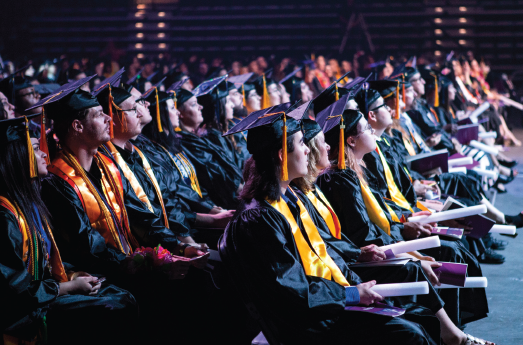
$1 Million Donation to Pima Community College
Bank of America Supports Hispanic, Black Students
By David Pittman
Pima Community College and Bank of America are partnering to provide the education and training needed to bring more students of color into the local workforce and on a path to professional success.
To make it happen, the bank is providing a $1 million investment over the next four years to PCC to address underlying issues facing Hispanic and Black students – such as disproportionate health and financial difficulties. Bank of America is also giving a similar $1 million gift to Arizona State University Downtown Phoenix.
“We remain committed to helping address the barriers to sustainable employment that exist for many communities of color,” said Adriana Kong Romero, who serves Bank of America as Tucson market president and was recently named commercial banking market executive in the Southwest. “This program helps support Black and Hispanic-Latino students in Southern Arizona by creating a collaborative approach to job training that will enable them to make a real and meaningful impact in their communities.”
PCC Chancellor Lee Lambert said, “The college is honored to partner with Bank of America to move the bar on graduation and workforce success” for PCC students. He added that the funding also “allows us to close critical skills gaps and open new opportunities for Pima graduates.”
The initiative is part of the bank’s $1 billion, national four-year program to advance racial equality and economic opportunity, which includes a $25 million commitment to enhance educational training for Black and Hispanic individuals.
In addition to PCC and ASU Downtown Phoenix, the nationwide initiative includes partnerships with nearly two dozen community colleges serving predominantly Black and Hispanic students, historically Black colleges and universities and public Hispanic-serving institutions.
“Today, less than 40 percent of community college students earn a certificate or degree within six years of enrollment,” Romero said. “At PCC, while some students transfer to a university to continue their education, fewer than 16 percent of students earn a certificate or degree within six years.”
With the support from Bank of America, Pima Community College will use its funding to accelerate the development and implementation of apprenticeship opportunities in manufacturing, IT, construction, logistics and emergency medical services. These program options will address specific skill gaps to create pathways to higher paying and family-sustaining jobs that are in demand to increase opportunity and enrollment for students of color. Bank of America will also work with partner employers to ensure the programs target specific hiring needs leading to future employment.
Romero, 41, has built an extremely successful banking career. Of Hispanic and Asian lineage, she was born in Tucson and raised in Douglas. Romero graduated with a bachelor’s degree in business and public administration from the University of Arizona and earned a master’s degree in organizational management from the University of Phoenix. She began her banking career in 1997 at Chase Bank (formerly Bank One) in Douglas. She joined Bank of America the following year and has served the company in a wide range of retail banking roles.
Effective the first day of 2021, Romero was promoted to the position of commercial banking market executive throughout vast areas of the southwestern US. In that capacity she leads teams of bankers in Southern Arizona; New Mexico; San Luis Obispo and Santa Barbara in California; and El Paso and Amarillo in Texas, in order to address social and economic concerns and build strong communities. In addition to those responsibilities, she continues her duties as Tucson market president for the bank.
Romero also devotes a great deal of time serving the community as a board member of the United Way of Tucson and Southern Arizona, Sun Corridor Inc., UArizona’s Eller College Center for Leadership Ethics, Hispanic Community Council and Hispanic Alumni Association, as well as numerous other charitable and civic causes.
Romero credited “three strong women” who raised her – her mother, an aunt and her grandmother—for her many accomplishments.
“I came from a family of educators who encouraged me to work hard and stressed the importance of education,” she said. “My mother was an elementary teacher, who later went into school administration; and my aunt was the principal of my elementary school. So there was no way I could get away with misbehaving at school. My grandmother, too, had a strong influence on me. I’ve also been fortunate to benefit from mentorship and sponsorship throughout my career.”





